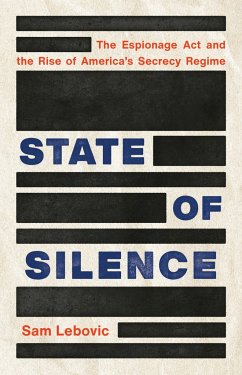"The Espionage Act was passed in 1917 to prosecute spies and critics during World War I. And yet, after a century of piecemeal revisions, the Espionage Act still forms the basis of our national security architecture today - a tool that lets the government keep an untold amount of information secret, without ever justifying the need for that secrecy. In State of Silence, political historian Sam Lebovic uncovers the troubling history of the Espionage Act and the shaky foundations on which our security state was built. The Espionage Act began as a series of vague statutes. Over time and aided by interventions from the executive branch and the courts, it became the basis of a patchwork system for protecting state secrets. Early drafts of the Act gave the president the authority to stop the presses. That provision was struck down after public outcry over freedom of speech, but the resulting legal ambiguities left room for decades of distortion as lawmakers leveraged Cold War paranoia into ever-tightening security. The resulting system for classifying information, Lebovic points out, is absurdly cautious: nearly 80 million documents are classified each year, and the system costs the government more than $18 billion annually to maintain. Aside from being costly, this system is shrouded in secrecy, hiding information from citizens in a way that Lebovic argues is fundamentally antithetical to our democracy. When individuals do try to make this information public, they're punished for it. As Lebovic shows, prosecuting whistleblowers (instead of journalists) has been built into our national security system from the beginning. Far before Julian Assange and Chelsea Manning, he shares with us the near-forgotten story of Colonel John Nickerson, the first whistleblower prosecuted under the Espionage Act in 1956 - and a proud Army man who had no idea that his sharing of information could be considered illegal. Finally, Lebovic calls for broad and sweeping reform, proposing a new approach to securing state secrets, one that places the interests of the people first from the very beginning. Shedding new light on the bloated governmental security apparatus that's weighing our democracy down, State of Silence offers the definitive history of America's turn toward secrecy--and its staggering human costs"--
Hinweis: Dieser Artikel kann nur an eine deutsche Lieferadresse ausgeliefert werden.
Hinweis: Dieser Artikel kann nur an eine deutsche Lieferadresse ausgeliefert werden.








